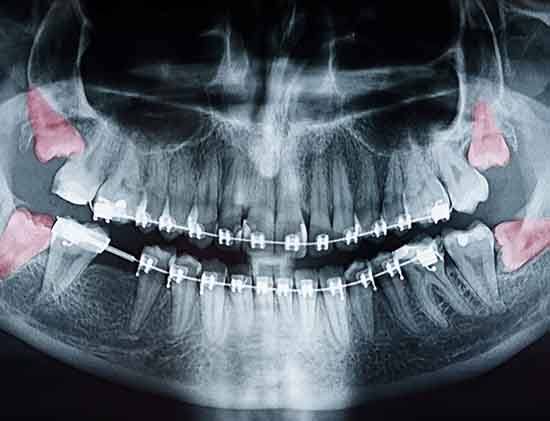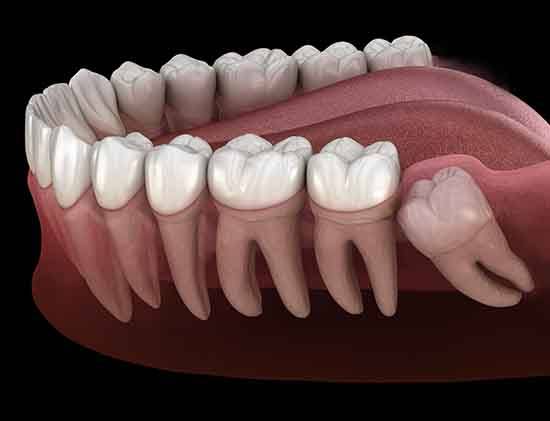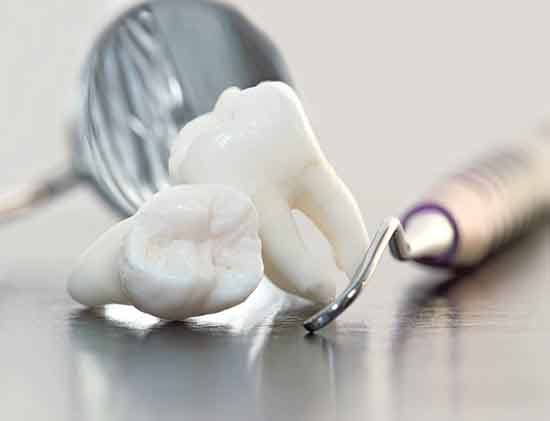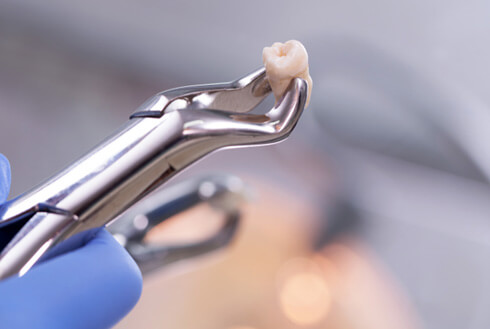Our Upper Arlington dental office is near the corner of Arlington Centre Blvd and W Henderson Rd, slightly south of The Ohio State University Airport. We’re also less than five minutes from Riverside Dr and the Olentangy Fwy.
Wisdom Tooth Extractions – Arlington, OH
Remove Problem Teeth to Safeguard Your Smile

Although ancient humans developed wisdom teeth out of necessity, today, they tend to cause more problems than they resolve. Thankfully, your dentist can safely remove problem teeth to safeguard your smile.
However, if you’re nervous about your upcoming appointment, you’re not alone! According to the U.S. National Library of Medicine, about 5 million Americans undergo this procedure every year. In fact, it’s so common that many people consider it to be a rite of passage for youths as they transition into adulthood.
Understanding the process and why it’s necessary can provide some much-needed peace of mind to settle your nerves before your wisdom tooth extraction. Below is more detailed information that can help. If you have additional questions, feel free to contact us.
Why Choose Tzagournis Dental Group for Wisdom Tooth Extractions?
- Skilled Dentists With 10+ Years of Experience
- Advanced Technology for Enhanced Patient Comfort
- Sedation Dentistry Available
What Are Wisdom Teeth?

Your wisdom teeth are your last set of molars that appear years after your other permanent ones grow in. It’s believed that they were once necessary to compensate for lost, broken, or decayed molars of ancient people. Today, they’re considered a vestigial feature because they no longer serve a functional purpose.
Your wisdom teeth are located in the very back of your mouth and typically arrive between the ages of 17 and 25. Although many people have all 4 (one for each end of both the upper and lower teeth), many people only develop 1 or 2. It’s also possible not to have any wisdom teeth at all.
Why Do Wisdom Teeth Need to Be Removed?

Evolutionary changes over time led to smaller mouths that don’t always have the space for extra teeth. As a result, wisdom teeth tend to cause oral problems as they struggle to push through your gums. You could develop:
- Overcrowding. They tend to push neighboring teeth out of the way, leaving you with a crooked smile. This makes it harder to keep them clean, which can cause cavities and gum disease.
- Bite misalignment. If your teeth shift out of place, it can lead to a bite misalignment that can cause TMJ (temporomandibular joint) disorders.
- These last molars aren’t always able to fully penetrate your gumline and can easily become infected.
- Wisdom teeth often grow at odd angles that make erupting impossible, and they develop a cyst below the gums that can impact the jawbone.
- It’s common to feel persistent throbbing as they try to push through.
What to Expect from the Wisdom Teeth Procedure

If your wisdom teeth grew straight through your gumline, then extracting them is relatively simple. First, our team will apply a local anesthetic and/or sedation to ensure that you don’t feel any discomfort. Then, we’ll use forceps to grasp the tooth and wiggle it free.
However, if your tooth is impacted, you may need a surgical extraction. This involves creating an incision in your gums and breaking the tooth into small pieces that can be more easily removed.
Recovering from Wisdom Teeth Extraction

Our team will provide detailed instructions to follow after your appointment to help you recover as quickly as possible without developing complications. We often ask that patients:
- Avoid drinking from straws. The force of the suction can dislodge the blood clot that must form over the incision site.
- Use gauze to address bleeding. It’s normal to have some oozing after your procedure, but biting firmly on a clean, folded piece of gauze can slow the flow.
- Steer clear of hard or crunchy foods. Your mouth is probably going to be sensitive for a few days, and these can exacerbate any aches.
- Rest up. You should avoid any activities that elevate your heart rate or blood pressure because this hinders healing.
- Manage discomfort. Take any prescribed pain medications as directed. If you weren’t given any, it’s usually safe to take Tylenol or ibuprofen to reduce swelling and inflammation.
Please call us right away if you experience lingering or persistent pain that lasts more than a few days, develop a fever, or have any other unusual symptoms.
Understanding the Cost of Wisdom Tooth Extractions

While you may want your wisdom teeth removed, you should first learn about the service’s price. You may commit to a treatment you can’t afford otherwise. Having said that, you’ll need to consult our dentists for an exact estimate; the cost of wisdom tooth extractions varies by patient. Our team will then strive to make the removal more affordable for you. For further details, please keep reading or call our office – we’ll gladly answer your questions!
Factors That Can Impact the Cost of Wisdom Tooth Extractions

At your consultation visit, our dentists will assess the relevant wisdom tooth (or teeth). Doing so lets us confirm the factors that will affect your removal cost. These elements are:
- Number of Wisdom Teeth – Not everyone has all four wisdom teeth, so your treatment’s cost depends on how many must be removed. Removing more will involve a higher expense.
- Presence of Impaction – In truth, it costs more to remove impacted wisdom teeth than non-impacted ones. The type of impaction also affects the price.
- For example, a soft tissue impaction won’t cost as much. Treatment for this kind applies when a wisdom tooth at least partly emerges from the gums.
- In contrast, treating a bony impaction can be pricey. Your surgeon will need to remove a tooth lodged in the jawbone, which is complex work.
- Whether You Need Sedation – You may need anesthesia or other sedatives for your extraction. In that case, you’ll have to pay more.
- Type of Specialist – If you require a complex wisdom tooth extraction, you may need to see an oral surgeon. Help from such an expert can be expensive, at least depending on your insurance.
Does Dental Insurance Cover Wisdom Tooth Extractions?

While dental insurance doesn’t always cover wisdom tooth removal, most plans do so at least partially. The final benefits applied will depend on whether you’ve met your yearly deductible and/or maximum. You can also choose an in-network dentist to minimize out-of-pocket costs.
Given the above points, you should call your insurance provider directly to confirm your benefits. Our team will gladly help with that process if you want.
How to Make Wisdom Tooth Extractions Affordable

Even without dental insurance, wisdom tooth extractions can still be affordable. You just need to rely on our practice’s varied payment options! Given the right one, having your wisdom teeth removed will be budget-friendly.
At the Tzagournis Dental Group of Upper Arlington, we offer payment options like:
- In-House Dental Plans – In exchange for a yearly fee, you can join one of our practice’s in-house dental plans. You could then get up to 15% off a wisdom tooth extraction.
- Flexible Financing – Our office works with CareCredit, a reputable 3rd party financier. They’d let you pay for your extraction in monthly installments with little or no interest.
Hopefully, you can see that our wisdom tooth extractions don’t have to “break the bank.” Simply visit our office to learn how to finance one soon!
Wisdom Tooth Extractions FAQs
Does Everyone Have Wisdom Teeth?
The truth is that not every person has (or will have) all four wisdom teeth. Around the world, some people only have one, two, or three of these third molars. Others don’t have any of them at all.
This fact is borne out by rigorous research among dentists. In a 2015 article from the Dental Research Journal, it was found that 5-37% of people worldwide lack one or more wisdom teeth. Some scholars thus believe that human genetics affect whether a person has third molars. If your parent doesn’t have all their wisdom teeth, perhaps you'll be missing one (or more) yourself.
How Do You Make Wisdom Teeth Pain Go Away?
The only permanent way to cure aching wisdom teeth is to remove them. That said, you can try a few home remedies to lessen your pain.
One method is to wrap a towel around an ice pack and apply it against your cheek. Doing so for 20 minutes at a time can reduce swelling and produce a numbing effect. Just make sure you don’t press ice directly against your skin.
Another good remedy is to take over-the-counter pain medications. In most cases, those like ibuprofen will offer temporary relief for throbbing wisdom teeth. However, don’t apply aspirin to the hurting area if it’s your chosen medicine. That would only worsen your pain by irritating your mouth tissues.
How Should I Prepare for My Wisdom Tooth Extraction?
You can take various steps to prepare for your wisdom tooth extraction. By performing them, your treatment should go quite smoothly.
For starters, don’t hesitate to ask your dentist any treatment questions you have. Their answers will let you know what to expect from the extraction process. You’ll then be able to make proper adjustments on your end.
Otherwise, follow your dentist’s guidance on what to do before your surgery. They may offer tips like:
- Have someone drive you to and from your visit, as you’ll feel woozy from sedation after treatment.
- Tell your dental team about any prescribed or store-bought medicines you take, as well as whether (or how often) you use alcohol and recreational drugs.
- Wear loose and comfy clothing for your procedure.
- Stock up on soft foods at home for the next few days.
How Long Does Wisdom Tooth Surgery Take?
On average, extracting one wisdom tooth takes about 15-20 minutes. That means your treatment may last up to 90 minutes if you have all four third molars. Really, the precise timing varies from patient to patient.
Various factors affect the exact timeline for wisdom tooth extraction. In particular, the most relevant ones include the tooth’s location, position, and whether it’s impacted. You’ll thus want to consult your dentist to get an estimate of how long your procedure will take.
Regardless of its exact timeline, rest assured that your extraction should feel pretty brief. You’ll almost certainly be sedated while your dentist performs the removal work. For that reason, you’ll barely register that time has passed once treatment is over.
Upper Arlington
(614) 457-1481 5025 Arlington Centre Blvd #220, Upper Arlington, OH
7:30 am - 4:00 pm
7:30 am - 4:00 pm
7:30 am - 4:00 pm
7:00 am - 5:00 pm
Closed
Westerville
(614) 882-4032 385 County Line Rd W Suite 100, Westerville, OH 43082
8:00 am - 5:00 pm
8:00 am - 6:00 pm
8:00 am - 5:00 pm
7:00 am - 5:00 pm
7:00 am - 1:00 pm
We’re in the same general location as the Westerville Community Center, on County Line Rd W between Africa Rd and N Cleveland Ave. We’re also less than five minutes west of N State Street.





